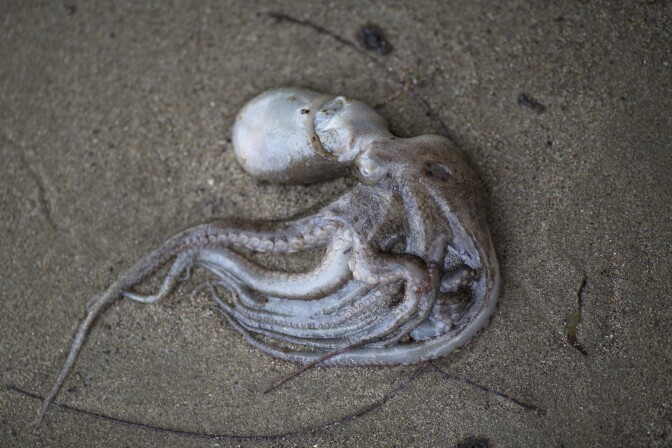This story is free to read because readers choose to support LAist. If you find value in independent local reporting, make a donation to power our newsroom today.
This archival content was originally written for and published on KPCC.org. Keep in mind that links and images may no longer work — and references may be outdated.
Report: Pipeline in Santa Barbara oil spill badly worn, owner to pay for tar ball cleanup

A preliminary report from the Pipeline and Hazardous Materials Safety Administration has found that last month's disastrous oil spill at Refugio State Beach in Santa Barbara County happened along a badly worn segment of pipe.
According to the Associated Press, the federal agency's early findings said investigators estimated the corrosion at the site of the pipe leak, which released upwards of 101,000 gallons of crude oil, had degraded the pipe wall thickness to 1/16 of an inch — roughly the thickness of a penny.
The report also noted the pipeline had undergone repairs near the break due to corrosion in 2012.
Richard Kuprewicz, president of Accufacts Inc., which investigates pipeline incidents, said over 80 percent of the pipe had been worn away.
"There is pipe that can survive 80 percent wall loss. When you're over 80 percent, there isn't room for error at that level," Kuprewicz said.
Meanwhile, as cleanup efforts continue two weeks after the spill sent as much as 21,000 gallons of crude into the Pacific Ocean, petroleum tar balls are washing ashore along beaches in Ventura, Los Angeles and Orange counties.
Though researchers have not yet found a link between the spill and the tar balls — oil seepages happen naturally along the coast — Plains All American Pipeline, owner of the burst pipe in Santa Barbara, has offered to foot the bill for some of the cleanup further down the coast.
"Until we know more, we’re responding to this as though it were part of the Refugio incident," said Plains spokesman Patrick Hodgins. "We are committing our resources to do whatever is necessary to clean those beaches."
Those beaches are in Santa Barbara and Ventura counties. It does not include the cleanup of Manhattan Beach, which was closed last week after tar balls inundated the sand.
Hodkins did not say how much the company has spent so far on the cleanup efforts.
Whatever that amount, more spill-related costs might be in the cards for Plains All American.
Stace Cheverez, a commercial fisherman from the Santa Barbara area, filed a lawsuit against the pipeline owner this week.
The lawsuit claims the company's lack of safety precautions and proper equipment led to the spill of an estimated 101,000 gallons of crude. Authorities say about 21,000 gallons entered a storm drain that led to the ocean.
The lawsuit alleges the spill would cause decades of harm to the local environment and hurt the business community, according to The Associated Press.
The suit does not specify damages but said they will exceed $5 million, reports AP.
As of Wednesday, 58 birds and 40 mammals had been recovered alive, according to the official count. The death toll was 87 birds and 53 mammals.
The nighttime coastal cleanups along local beaches will be temporarily suspended to allow the seasonal spawning of California grunion, who emerge to lay their eggs at night during high tides.
This story has been updated.







